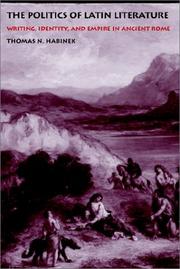| Listing 1 - 2 of 2 |
Sort by
|

ISBN: 0691089841 0691068275 1400822513 128275338X 9786612753381 1400811929 9781400811922 9781400822515 9780691068275 6612753382 9781282753389 9780691089843 Year: 1998 Publisher: Princeton (N.J.) Princeton university press
Abstract | Keywords | Export | Availability | Bookmark
 Loading...
Loading...Choose an application
- Reference Manager
- EndNote
- RefWorks (Direct export to RefWorks)
This is the first book to describe the intimate relationship between Latin literature and the politics of ancient Rome. Until now, most scholars have viewed classical Latin literature as a product of aesthetic concerns. Thomas Habinek shows, however, that literature was also a cultural practice that emerged from and intervened in the political and social struggles at the heart of the Roman world. Habinek considers major works by such authors as Cato, Cicero, Horace, Ovid, and Seneca. He shows that, from its beginnings in the late third century B.C. to its eclipse by Christian literature six hundred years later, classical literature served the evolving interests of Roman and, more particularly, aristocratic power. It fostered a prestige dialect, for example; it appropriated the cultural resources of dominated and colonized communities; and it helped to defuse potentially explosive challenges to prevailing values and authority. Literature also drew upon and enhanced other forms of social authority, such as patriarchy, religious ritual, cultural identity, and the aristocratic procedure of self-scrutiny, or existimatio. Habinek's analysis of the relationship between language and power in classical Rome breaks from the long Romantic tradition of viewing Roman authors as world-weary figures, aloof from mundane political concerns--a view, he shows, that usually reflects how scholars have seen themselves. The Politics of Latin Literature will stimulate new interest in the historical context of Latin literature and help to integrate classical studies into ongoing debates about the sociology of writing.
Groepsgevoel in de literatuur --- Group identity in literature --- Identité de groupe dans la littérature --- -Group identity in literature --- Imperialism in literature. --- Group identity in literature. --- Politics and literature --- Authorship --- Latin literature --- Authoring (Authorship) --- Writing (Authorship) --- Literature --- Political aspects --- History and criticism. --- Imperialism in literature --- History and criticism --- Rome --- Latin literature - History and criticism --- Authorship - Political aspects - Rome --- Politics and literature - Rome

ISBN: 9042914467 2877237834 9789042914469 Year: 2004 Volume: 39 Publisher: Leuven : Editions Peeters,
Abstract | Keywords | Export | Availability | Bookmark
 Loading...
Loading...Choose an application
- Reference Manager
- EndNote
- RefWorks (Direct export to RefWorks)
Latijnse letterkunde --- Littérature latine --- Latin literature --- Authorship --- Politics and literature --- Literature and society --- Authors, Latin --- Art d'écrire --- Politique et littérature --- Littérature et société --- Ecrivains latins --- History and criticism. --- Political aspects --- Social aspects --- Biography. --- Histoire et critique --- Aspect politique --- Aspect social --- Biographies --- Rome --- History --- Histoire --- Littérature latine --- Art d'écrire --- Politique et littérature --- Littérature et société --- Authoring (Authorship) --- Writing (Authorship) --- Literature --- History and criticism --- Authors [Latin ] --- Biography --- Republic, 265-30 B.C. --- Latin literature - History and criticism. --- Authorship - Political aspects - Rome. --- Authorship - Social aspects - Rome. --- Politics and literature - Rome. --- Literature and society - Rome. --- Authors, Latin - Biography. --- Rome - History - Republic, 265-30 B.C.
| Listing 1 - 2 of 2 |
Sort by
|

 Search
Search Feedback
Feedback About
About Help
Help News
News